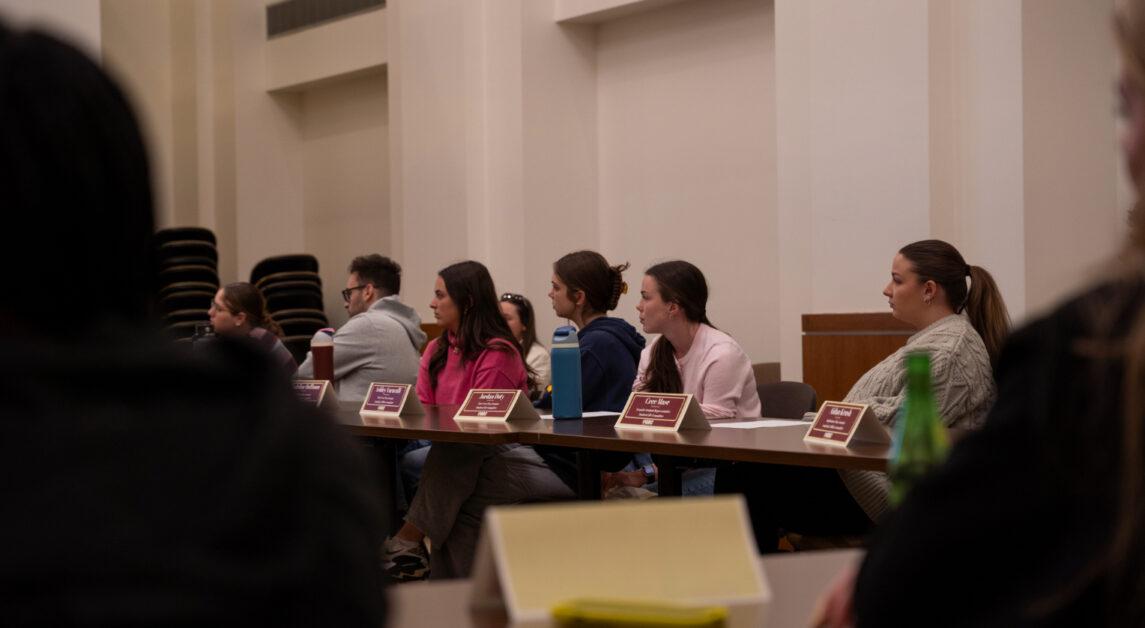It’s February of one of those special fourth years, bringing, of course, the Winter Olympics. In the midst of this year’s honors, athleticism, competition, commercialism, and scandal, a look at previous Heights editions reveals how Boston College students anticipated and celebrated Winter Olympics in the past.
In February 2010, the XXI Winter Olympics in Vancouver generated much excitement among BC students. On Feb. 11, Kristen House, noting the criticisms surrounding the Olympics due to its glitz and over-glamorization, still advised BC students to “take this time to appreciate, at the most basic level, the skills of the world’s most talented athletes.” House talked about “harboring a childlike excitement for the Olympics-if only because they encourage us to appreciate athleticism, healthy competitive spirit, and a break from society’s isolation.” She advised BC students to pay attention to the athletes’ stories and the genuine emotions behind the wins, losses, and displays of togetherness and sportsmanship.
In the Feb. 15 edition, Joseph DeMaio highlighted the must-see events of the XXI Winter Olympics. His first recommendation: curling. DeMaio wrote, “Where else do you get to see ‘athletes’ in tracksuits pushing rocks around and sweeping ice? The sheer absurdity of the sport makes it a must-watch.” Downhill skiing, luge, skeleton, hockey (especially women’s hockey, with then-current BC players Molly Schaus and Kelli Stack), and the snowboard Super Pipe were further recommended.
Meanwhile, he suggested that, “figure skating, speed skating, and ice dancing are all to be avoided,” due to obnoxious commentators, unfair judges, and uninspiring music. (An earlier Heights edition published on Feb. 16, 2006, however, asked BC students about their favorite Winter Olympics events, and figure skating received the overwhelming majority.)
Janine Hanrahan, in her Feb. 18 article, wrote about some of the more dramatic stories from the Olympics, including Georgian luger Nodan Kumaritashvili’s tragic death, Canadian skier Alexandre Bilodeau winning the gold in the men’s moguls freestyle skiing and the inspiration he received from his older brother’s struggle with cerebral palsy, and Chinese figure skating pair and married couple Shen Xue and Zhao Hongbo winning the gold after skating together for 18 years and coming out of retirement.
Hanraham wrote, “It is not difficult to get behind any of the athletes. They all work extremely hard to get where they are, and many of them have compelling stories.”
BC students, however, were more critical about the 2006 Winter Olympics in Turin. “The American media has seized upon scandals, bombings, doping incidents, and general negativity surrounding the Olympics to the point that most of Americans’ memories of past athletes’ performances are clouded by the scandals,” Jeff Weinstein wrote in an article from Feb. 9. “If newspapers across America actually took the time to tell the stories of commitment and dedication instead of corruption, maybe our impression of the Olympic Games would be different.”
In the Feb. 13 edition, an editorial elaborated this, mentioning that through prominent scandals “from Apolo Anton Ohno’s battle with the Koreans, to the French figure skating judge, to the rampant doping scandal, the media likes to highlight the tragedies of human nature as much as the triumphs, if not more so.” They also stress the importance of remembering the Olympics’ true purpose, however: to display the best of human nature and athleticism.
Another editorial mentioned North and South Korea walking as one nation at the opening ceremony, BC’s women’s hockey then-assistant coach Katie King being on her third Olympic team, and Michelle Kwan tragically being unable to win one last gold medal. They state that in the face of “a world divided over cartoons, nuclear weapons, religious wars, and terrible violence, the next two weeks provide us with a common ground that any language can understand: the spirit of competition.”
February 2002 saw the XIX Winter Olympics held in Salt Lake City. In his Feb. 16 article, Ryan Brown wrote about the money donated by corporate sponsors to allow athletes to be able to compete in the Olympics. Instead of focusing on the commercialization, however, Brown wrote about the national pride behind corporate sponsorship, especially considering that these Olympics were held on American soil five short months after Sept. 11.
Brown stated, “this year, in the midst of a national tragedy and a war on terrorism, corporate sponsorship has taken on an entirely new meaning for many corporations. No longer is it solely about getting more consumers to purchase their products.” Instead, sponsorship was seen as a way to show support for America, especially American athletes in their endeavors to fulfill their dreams.
This year, during the XXII Winter Olympics, take the time to strip away the glitz and glamour, the scandal and negativity, the commercialization and propaganda, and truly appreciate the Olympics for what it truly is meant to be-a display of athletic competition and unification. Like BC students of the past, watch your favorite events, cheer for your favorite teams and athletes, and celebrate the Olympic tradition of sportsmanship and togetherness.
AP Photo/David J. Phillip






